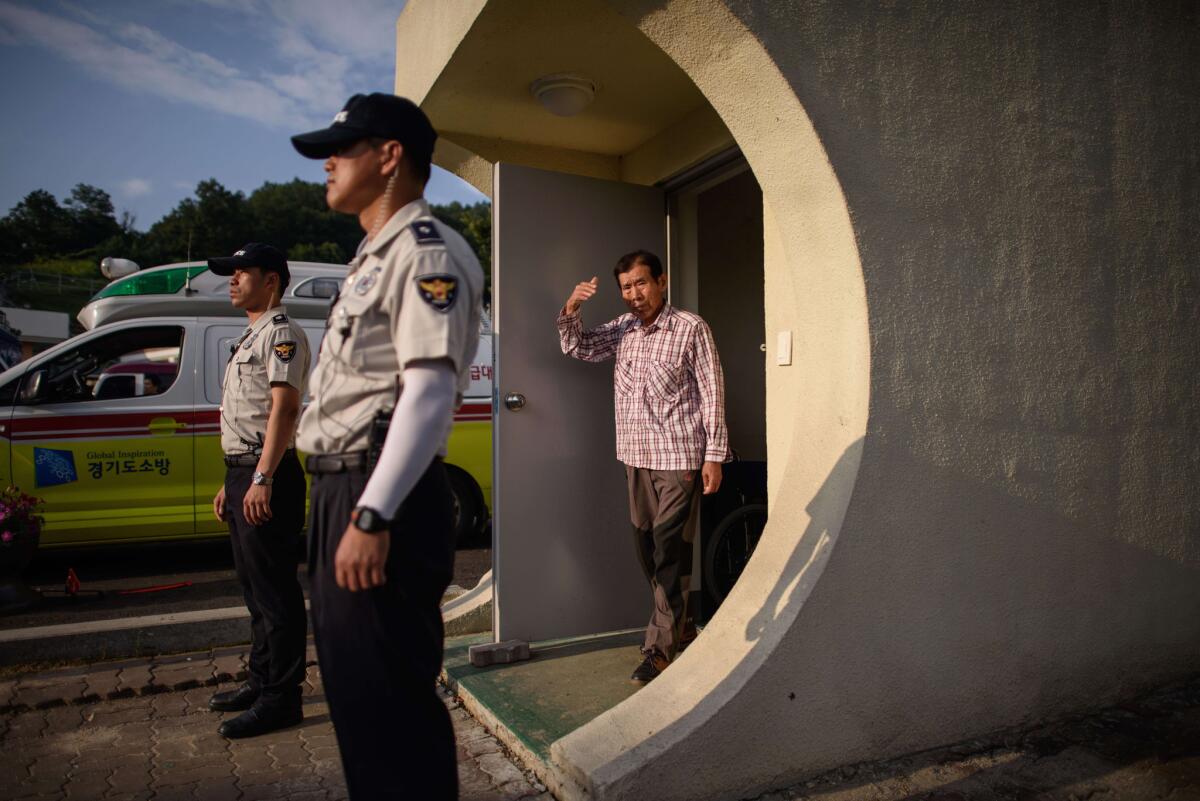Seeking to ease tensions, North and South Korean officials meet at the border

A South Korean resident walks out of a guarded bunker in the border village of Yeoncheon near the demilitarized zone.
Reporting from Seoul — North and South Korean officials met at a town on the heavily guarded border between the two countries Saturday in a bid to defuse tensions days after a volley of cross-border artillery fire put both countries’ armed forces on high alert.
Four high-ranking officials — two from the North and two from the South — met at the border truce village of Panmunjom on Saturday evening, according to local media.
North Korea warned Friday that it would launch an attack if South Korea did not stop blaring anti-Pyongyang propaganda from border-side loudspeakers by 5 p.m. Saturday. The deadline passed without any reported incidents, and the two sides met shortly afterward.
The two countries, technically at war since the 1950s, entered a period of heightened tensions in mid-August, when Seoul accused North Korean soldiers of sneaking across the border and planting land mines near a military post. Seoul retaliated by activating the loudspeakers for the first time since 2004. On Thursday, North Korea lobbed a projectile at one of the loudspeakers, and South Korea fired dozens of artillery shells at the source of the attack.
North Korean leader Kim Jong Un has ordered the border region to enter a “semi state of war,” according to the state-run Korean Central News Agency.
South Korea sent national security director Kim Kwan-jin and Unification Minister Hong Yong-pyo as representatives to the talks, according to the Associated Press; the North sent Hwang Pyong-so, Kim’s top military aide, and Kim Yong-gon, a senior official responsible for South Korean affairs.
“The senior status of the negotiators from the two delegations — they are the de facto defense and unification chiefs from both sides — and the speed with which this meeting was set up shows how gravely the current situation is viewed in both Pyongyang and Seoul,” said Andrew Salmon, a Seoul-based historian and author of two books on the Korean War.
Local media ran photos of the four men smiling and shaking hands at the meeting’s outset. Some of the participants also attended talks in October when North Korean officials made a surprise visit to the South Korean city of Incheon, which was then hosting the Asian Games, a major sports event. The two sides have not held any high-level talks since.
This week, the United Nations Command proposed engaging North Korea in talks to ease the cross-border tensions, according to South Korea’s Yonhap News Agency. China, North Korea’s most important ally and benefactor, and the U.S. also made statements calling for calm.
On Friday, South Korean President Park Geun-hye made a surprise visit to an army headquarters and instructed troops to respond strongly to any North Korean provocation. “We can never tolerate any North Korean provocations that could endanger the safety of our soldiers and people,” Park said, according to Yonhap.
Exchanges of harsh rhetoric between the two sides are not unusual, and experts generally downplay the possibility of serious conflict. In 2010, after North Korea shelled the South’s Yeonpyeong Island, many South Koreans criticized their government for what they perceived as a weak and ineffective response. Since then, South Korean officials often have made a point of pledging harsh responses to any North Korean incursions.
Though North Korea has standing forces of more than 1 million, its military lacks the firepower and sophistication of the South Korean armed forces. About 28,500 American troops are stationed in South Korea.
Analysts say that Pyongyang is therefore unlikely to undertake any military action that could lead to all-out war and that its provocations may serve a domestic propaganda purpose.
Much of North Korea’s propaganda is concerned with creating an image of the country as standing strong against foreign powers that wish it harm. Declaring a “semi state of war,” as North Korea did this week, can have a mobilizing effect domestically, said Adam Cathcart, a Korea expert at Leeds University.
“The North Korean system has few other incentives for people to get up in the morning and do their jobs with any kind of enthusiasm,” he added.
Special correspondent Borowiec reported from Seoul and Times staff writer Kaiman from Beijing.
Follow @jrkaiman on Twitter for news out of Asia
More to Read
Sign up for Essential California
The most important California stories and recommendations in your inbox every morning.
You may occasionally receive promotional content from the Los Angeles Times.










